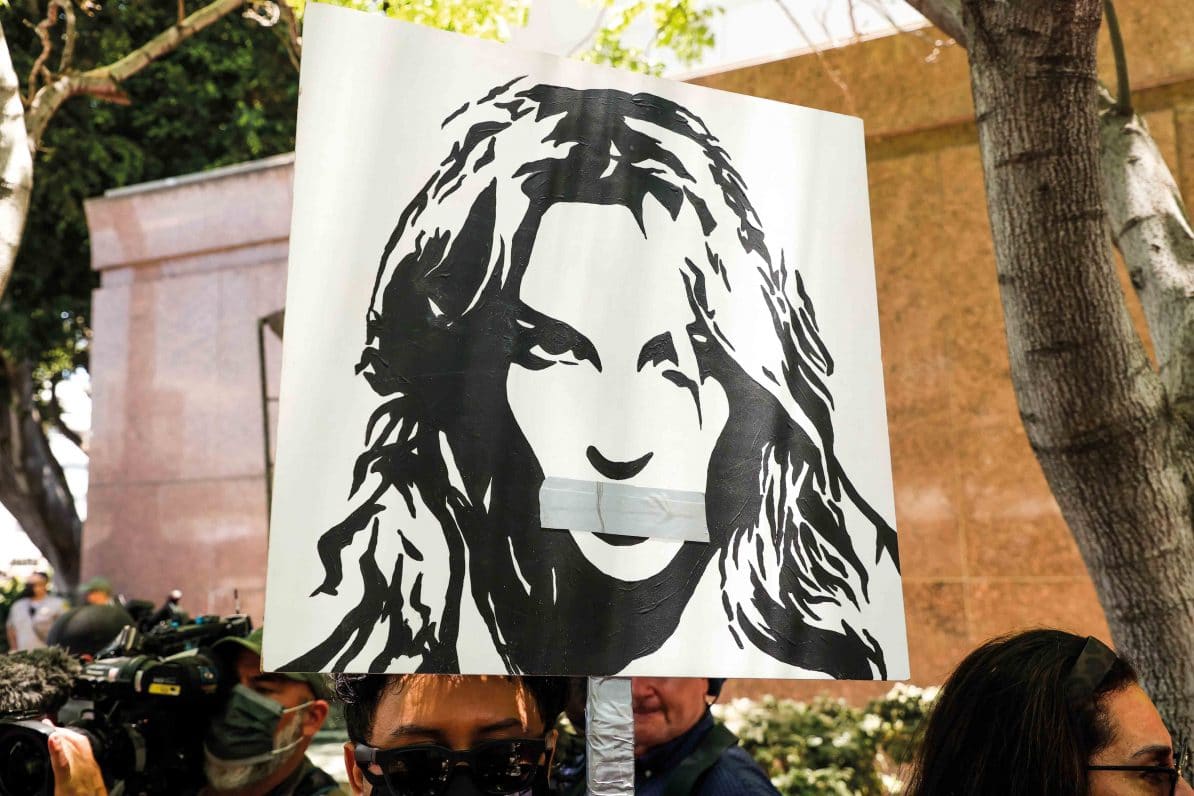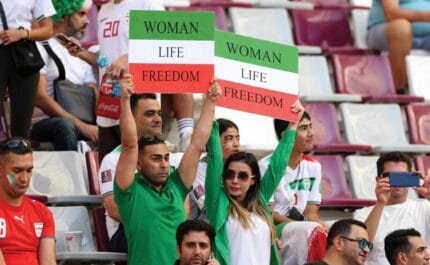Moment that mattered: Britney Spears speaks out in court against her conservatorship
We spoke to podcaster, comedian and #FreeBritney activist Tess Barker about the day the pop star's views on the controversial legal arrangement that controlled her life were finally heard by the public

#FreeBritney activists protest during a conservatorship hearing on 23rd June 2021 in Los Angeles, California. Photo: Rich Fury/Getty Images
23rd June 2021 (Taken from: #43)
[This interview took place in September 2021. A Los Angeles court terminated Spears’s conservatorship on 12th November 2021.]
After 13 years in a conservatorship that controlled many aspects of her life, Britney Spears spoke out publicly against the legal arrangement for the first time on 23rd June. Until the moment the pop star began reading her testimony to the Los Angeles court, it still wasn’t certain whether her views would be heard by the public. But when a lawyer for the conservatorship said that her testimony needed to be heard in private, the 39-year-old, calling in to the court by phone, interrupted to demand an open hearing.
“It was a total mic drop moment,” recalls podcaster Tess Barker, who was in the courtroom. “You could feel the entire room collectively stop breathing.” Having been granted an open hearing, Spears didn’t hold back. She alleged that she had been financially exploited; forced to perform against her will; blocked from getting married and from removing her birth-control device, thereby preventing her from having more children; and made to take powerful medication she didn’t want to take. She claimed that her father, Jamie Spears, who oversaw her finances, career and many aspects of her personal life for most of the period since 2008, loved to control her. She alleged that the conservatorship was abusive, doing her far more harm than good, and that she wanted it to end. While her complaints had never been heard before by the public, it seems that at least some of them had been heard by the authorities – she complained of “not being heard at any level” at a previous hearing in 2019, which was held behind closed doors.
The conservatorship is arranged in two parts, with separate oversight of Britney Spears’s financial affairs and her personal life; the conservatorship of the latter changed hands in 2019 when Jamie Spears stepped down from it citing health reasons. On 29th June, his lawyers asked the court to investigate his daughter’s allegations regarding her personal affairs, saying that he was not involved because he has been “cut off from communicating with her”.
In court on 23rd June everyone heard what Britney had to say. “I remember being taken aback by just how passionate and lucid she sounded,” says Barker, who also recalls seeing the lawyers for the conservatorship, who addressed the court via video-conferencing software, “stare at their cameras like deer in headlights” as Spears spoke. Outside the court, meanwhile, around 100 #FreeBritney protesters hugged with joy. “The mood was ecstatic,” says Barker of the scene that greeted her as she left the building. “It felt like a huge win.”
The testimony didn’t merely represent victory for the protesters, who since 2019 had tried to make the case that Spears was being held against her will. It was also a vindication. Jamie Spears had dismissed the #FreeBritney movement as “a joke” and its members as “conspiracy theorists”. For Barker and her colleague Babs Gray, Britney Spears’s testimony was especially validating after they had devoted two years to investigating the conservatorship. “It meant everything [to hear Spears’s testimony] because anybody who had been advocating for her had been gaslit… and we certainly had moments where we thought, ‘Gee, she hasn’t talked directly about it – are we definitely doing the right thing?’” says Barker.
Barker and Gray weren’t just members of the #FreeBritney movement. In a sense, they founded it. They used to co-host Britney’s Gram, a comedy podcast in which they dissected the singer’s Instagram posts to the nth degree. One day in April 2019, at a time Spears had mysteriously vanished from the public eye, they received an anonymous voicemail. The caller, who claimed to be a former paralegal who had worked on the Spears conservatorship, alleged that the star had been forced into a mental health facility against her will. Barker and Gray released the message on an episode of Britney’s Gram entitled #FreeBritney – and fired up a movement. “That tip-off changed everything,” Barker recalls. “There is ‘before the voicemail’ and ‘after the voicemail’. It became all-consuming. It felt like finding a dinosaur in your backyard.”
After the episode went live, the hashtag began trending on social media. Real-life protests took place in Barker and Gray’s hometown of Los Angeles, and Lynne Spears, the singer’s mother, used the hashtag while speaking out against the conservatorship’s control over her daughter. The duo dived into the deep-end, poring over court documents, attending hearings and interviewing people who might have had an insight into Spears’s private life. Their findings are presented in Toxic, a recent investigative podcast about the conservatorship, which they were in the middle of making when the bombshell court statement dropped. “It was a wonderful reason to have to do a lot of rewrites,” reflects Barker.
In one episode of Toxic they examined the origins of the conservatorship in 2008, when Jamie Spears petitioned the court for legal authority over his daughter’s career and personal life after she was committed to a psychiatric ward for a second time. The more they researched the weekend the conservatorship began, Barker says, the more it seemed to them like Spears’ life had been taken over “in plain view”.
“The standard is that conservatorships are supposed to be for individuals who can’t feed, clothe or shelter themselves,” she continues. “It’s for people [who need help] doing those basic day-to-day things in life.” Yet over the past 13 years, Spears hasn’t looked like someone who’s struggling. She’s enjoyed enormous success – hit records, world tours, a Las Vegas residency. Her estate is worth around $60 million and yet it’s alleged that “she couldn’t do little things we take for granted, like… riding in her car with her boyfriend or even visiting a friend,” says Barker. “We’re talking about someone on the same level [of fame] as Beyoncé having virtually no liberty in her day-to-day life.”
In February 2021 the #FreeBritney movement swelled in size when the New York Times released a sympathetic documentary, Framing Britney Spears, in which Barker and Gray featured prominently. It portrayed Spears as a victim of a celebrity culture that was cruel and unforgiving, especially towards young women. Her hounding by paparazzi seemed to contribute to a decline in mental health which ultimately cost her her freedom. “In the entertainment industry young women are turned into products, and when you make a person a product they become an object and you stop thinking about their humanity,” says Barker, who says she can relate to Spears because she was also a child actor in Los Angeles and witnessed firsthand how badly young women were treated.
Spears’s case may not only be of consequence to her and those who control her personal and professional life. Around 1.3 million Americans are in conservatorships, and Spears’s allegations have put the spotlight on how such legal arrangements can potentially be abused. If a person as wealthy and successful as Spears, who according to confidential court records obtained by the New York Times had been privately calling for her father to be removed as conservator as early as 2014, has so little control over her own life, what hope is there for ordinary people who are unhappy with their guardianship arrangements? “Part of the problem is that there’s virtually no data on how prevalent conservatorship abuse is,” says Barker. “Here in California there is virtually no recourse if you or someone you love is in an abusive conservatorship.”
On 20th July, two lawmakers, Charlie Crist of Florida and Nancy Mace of South Carolina, proposed a new bipartisan piece of legislation, the Freedom and Right to Emancipate from Exploitation Act, which they said would help protect people in conservatorships from abuse. Mace described Spears’s situation as “a nightmare” and thanked her for “her courage” in speaking publicly and for drawing attention to the challenges other Americans might be facing.
Barker is also impressed by the singer’s bravery. “Knowing that she said most of these things to a judge two years ago and nothing happened, how resilient do you have to be to say ‘I’m going to go back and try again’?” Whether the release of the anonymous tip-off on Britney’s Gram helped Spears in her bid for freedom can’t truly be known – it’s hard to assess the impact of the increased media scrutiny of the conservatorship on Spears’s determination to be heard by the public and her father’s subsequent turnaround. But Barker feels good about it. “As I was hearing her testimony I thought to myself, ‘I’m so glad we released that voicemail.’”
In August, Jamie Spears said he would step down from his role as conservator of his daughter’s estate and finances “when the time was right”, and on 7th September he filed a petition for the court to consider ending the conservatorship. On 29th September, Barker was back outside the Los Angeles courthouse with Gray and their fellow #FreeBritney protesters. When the court suspended Jamie Spears from his daughter’s conservatorship and set a November date to discuss terminating it altogether, Barker posted a jubilant selfie to Twitter accompanied by three letters: “OMG”.
Slow Journalism in your inbox, plus infographics, offers and more: sign up for the free DG newsletter. Sign me up
Thanks for signing up.








